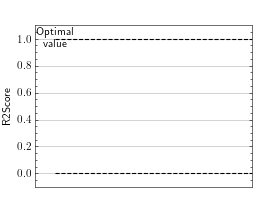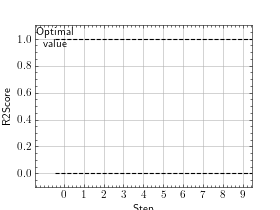R2 Score¶
Module Interface¶
- class torchmetrics.R2Score(num_outputs=1, adjusted=0, multioutput='uniform_average', **kwargs)[source]¶
Compute r2 score also known as R2 Score_Coefficient Determination.
\[R^2 = 1 - \frac{SS_{res}}{SS_{tot}}\]where \(SS_{res}=\sum_i (y_i - f(x_i))^2\) is the sum of residual squares, and \(SS_{tot}=\sum_i (y_i - \bar{y})^2\) is total sum of squares. Can also calculate adjusted r2 score given by
\[R^2_{adj} = 1 - \frac{(1-R^2)(n-1)}{n-k-1}\]where the parameter \(k\) (the number of independent regressors) should be provided as the adjusted argument. The score is only proper defined when \(SS_{tot}\neq 0\), which can happen for near constant targets. In this case a score of 0 is returned. By definition the score is bounded between 0 and 1, where 1 corresponds to the predictions exactly matching the targets.
As input to
forwardandupdatethe metric accepts the following input:preds(Tensor): Predictions from model in float tensor with shape(N,)or(N, M)(multioutput)target(Tensor): Ground truth values in float tensor with shape(N,)or(N, M)(multioutput)
As output of
forwardandcomputethe metric returns the following output:r2score(Tensor): A tensor with the r2 score(s)
In the case of multioutput, as default the variances will be uniformly averaged over the additional dimensions. Please see argument
multioutputfor changing this behavior.- Parameters:
num_outputs¶ (
int) – Number of outputs in multioutput settingadjusted¶ (
int) – number of independent regressors for calculating adjusted r2 score.Defines aggregation in the case of multiple output scores. Can be one of the following strings:
'raw_values'returns full set of scores'uniform_average'scores are uniformly averaged'variance_weighted'scores are weighted by their individual variances
kwargs¶ (
Any) – Additional keyword arguments, see Advanced metric settings for more info.
- Raises:
ValueError – If
adjustedparameter is not an integer larger or equal to 0.ValueError – If
multioutputis not one of"raw_values","uniform_average"or"variance_weighted".
Example
>>> from torchmetrics.regression import R2Score >>> target = torch.tensor([3, -0.5, 2, 7]) >>> preds = torch.tensor([2.5, 0.0, 2, 8]) >>> r2score = R2Score() >>> r2score(preds, target) tensor(0.9486)
>>> target = torch.tensor([[0.5, 1], [-1, 1], [7, -6]]) >>> preds = torch.tensor([[0, 2], [-1, 2], [8, -5]]) >>> r2score = R2Score(num_outputs=2, multioutput='raw_values') >>> r2score(preds, target) tensor([0.9654, 0.9082])
- plot(val=None, ax=None)[source]¶
Plot a single or multiple values from the metric.
- Parameters:
val¶ (
Union[Tensor,Sequence[Tensor],None]) – Either a single result from calling metric.forward or metric.compute or a list of these results. If no value is provided, will automatically call metric.compute and plot that result.ax¶ (
Optional[Axes]) – An matplotlib axis object. If provided will add plot to that axis
- Return type:
- Returns:
Figure and Axes object
- Raises:
ModuleNotFoundError – If matplotlib is not installed
>>> from torch import randn >>> # Example plotting a single value >>> from torchmetrics.regression import R2Score >>> metric = R2Score() >>> metric.update(randn(10,), randn(10,)) >>> fig_, ax_ = metric.plot()

>>> from torch import randn >>> # Example plotting multiple values >>> from torchmetrics.regression import R2Score >>> metric = R2Score() >>> values = [] >>> for _ in range(10): ... values.append(metric(randn(10,), randn(10,))) >>> fig, ax = metric.plot(values)

Functional Interface¶
- torchmetrics.functional.r2_score(preds, target, adjusted=0, multioutput='uniform_average')[source]¶
Compute r2 score also known as R2 Score_Coefficient Determination.
\[R^2 = 1 - \frac{SS_{res}}{SS_{tot}}\]where \(SS_{res}=\sum_i (y_i - f(x_i))^2\) is the sum of residual squares, and \(SS_{tot}=\sum_i (y_i - \bar{y})^2\) is total sum of squares. Can also calculate adjusted r2 score given by
\[R^2_{adj} = 1 - \frac{(1-R^2)(n-1)}{n-k-1}\]where the parameter \(k\) (the number of independent regressors) should be provided as the
adjustedargument.- Parameters:
adjusted¶ (
int) – number of independent regressors for calculating adjusted r2 score.Defines aggregation in the case of multiple output scores. Can be one of the following strings:
'raw_values'returns full set of scores'uniform_average'scores are uniformly averaged'variance_weighted'scores are weighted by their individual variances
- Raises:
ValueError – If both
predsandtargetsare not1Dor2Dtensors.ValueError – If
len(preds)is less than2since at least2samples are needed to calculate r2 score.ValueError – If
multioutputis not one ofraw_values,uniform_averageorvariance_weighted.ValueError – If
adjustedis not anintegergreater than0.
- Return type:
Example
>>> from torchmetrics.functional.regression import r2_score >>> target = torch.tensor([3, -0.5, 2, 7]) >>> preds = torch.tensor([2.5, 0.0, 2, 8]) >>> r2_score(preds, target) tensor(0.9486)
>>> target = torch.tensor([[0.5, 1], [-1, 1], [7, -6]]) >>> preds = torch.tensor([[0, 2], [-1, 2], [8, -5]]) >>> r2_score(preds, target, multioutput='raw_values') tensor([0.9654, 0.9082])
